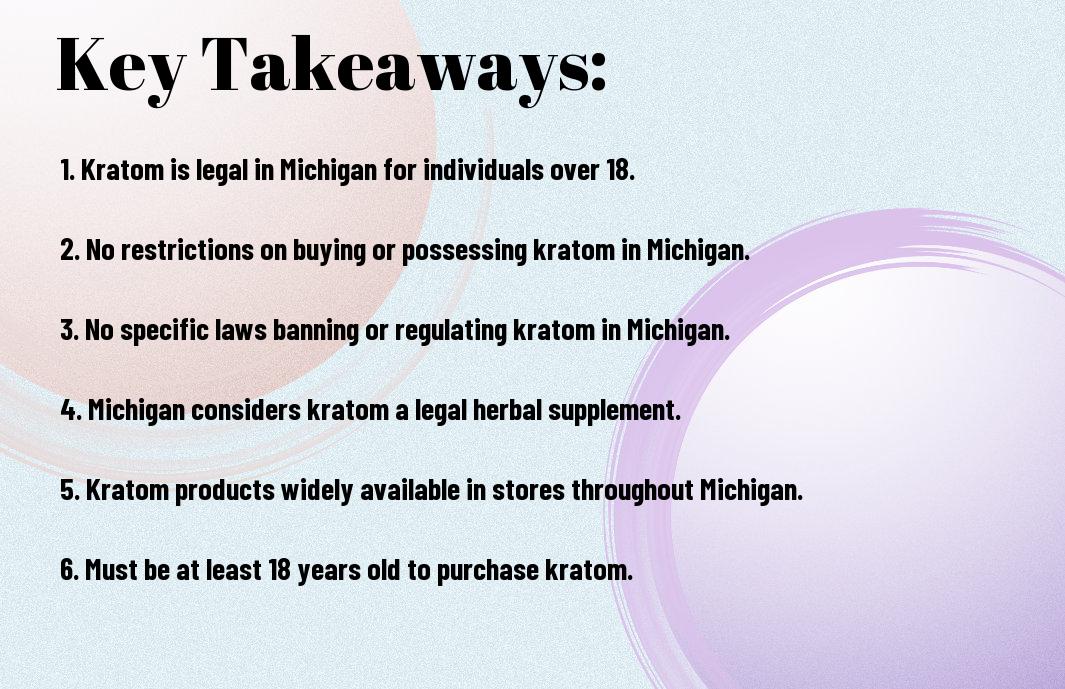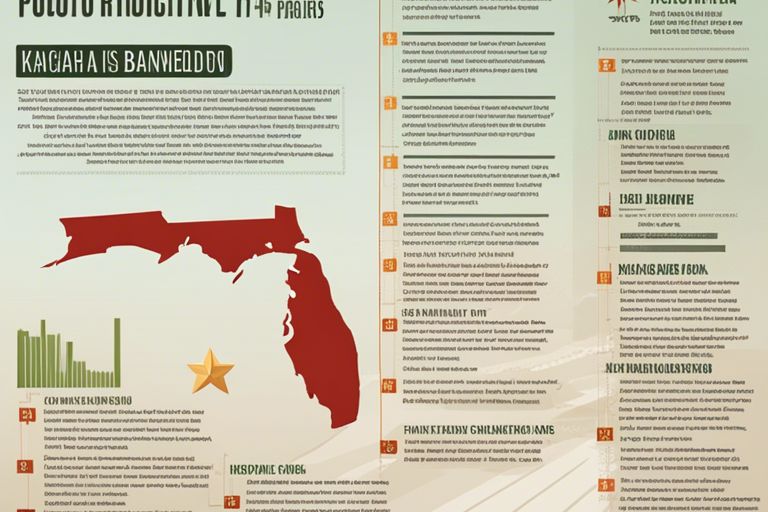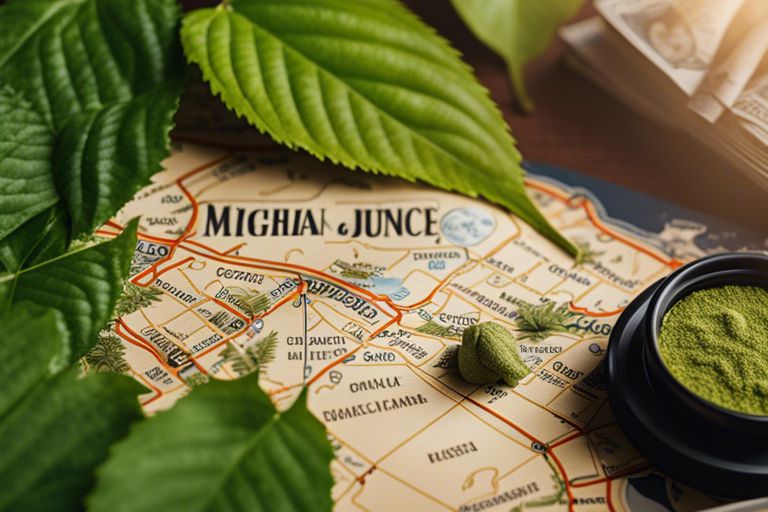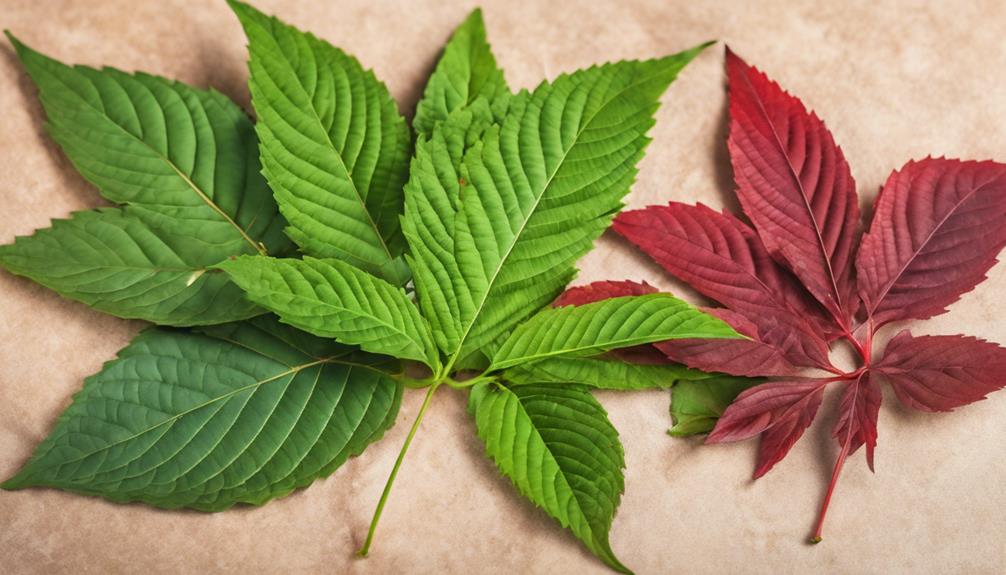Many of you may be wondering about the legal status of kratom in Michigan. Well, you’ve come to the right place for some insightful information. As we investigate the murky waters of state laws and regulations, buckle up and get ready for a ride through the wild world of kratom legality in the Great Lakes State. Let’s uncover the truth together, shall we?

Kratom Basics
What is Kratom?
With the growing popularity of kratom in the United States, you might be wondering what exactly this mysterious plant is. Kratom, scientifically known as Mitragyna speciosa, is a tropical evergreen tree indigenous to Southeast Asia. The leaves of the kratom tree contain compounds that have psychotropic (mind-altering) effects when consumed, making it a sought-after botanical substance.
Origins and History
Origins and history are intriguing aspects of kratom that add to its mystique. Cultures in Southeast Asia have been using kratom for centuries, primarily for its stimulating and pain-relieving properties. In countries like Thailand, Malaysia, and Indonesia, kratom was traditionally chewed, brewed into tea, or used in rituals and cultural practices.
Kratom made its way to the Western world in recent decades, where it gained a dedicated following for its potential mood-enhancing and energizing effects. As the demand for kratom grew, so did the controversy surrounding its legality and safety, leading to ongoing debates and regulations in various states and countries.
Legal Status of Kratom
Assuming you’re interested in the legal status of kratom in Michigan, you may want to keep an eye on the potential regulations being considered. A Michigan may regulate sale of kratom, an herbal mix linked to overdoses suggests that new rules could be on the horizon due to safety concerns.
Federal Laws and Regulations
Any discussion about kratom’s legality must consider federal laws and regulations. The legality of kratom at the federal level is a bit complex. While kratom is not classified as a controlled substance under the Controlled Substances Act, the FDA has issued warnings about its potential health risks, and the DEA has listed it as a Drug and Chemical of Concern.
State-by-State Laws and Regulations
With regards to Michigan specifically, it’s important to note that individual states have the authority to regulate or ban kratom within their borders. Some states have banned kratom outright, while others have imposed age restrictions or labeling requirements. Status can vary, so it’s advisable to stay informed about the laws in your state, especially as they may evolve.

Michigan’s Stance on Kratom
Keep yourself informed about the legal landscape of kratom in Michigan to ensure you are complying with the state regulations. Understanding the laws and ongoing efforts regarding this botanical substance is important for kratom enthusiasts in the Great Lake State.
Current Laws and Regulations
The current legal status of kratom in Michigan is that it is legal for individuals over 18 years old. However, it is crucial to stay updated on any changes in legislation as laws can evolve. Make sure to purchase kratom from reputable sources and adhere to dosage recommendations to enjoy its benefits responsibly.
Efforts to Ban or Restrict Kratom
Regulations surrounding kratom in Michigan have seen attempts at restriction in the past. It is important to stay vigilant and advocate for the responsible use of kratom. Being an informed and responsible consumer can help maintain access to kratom in Michigan while ensuring safety and legality for all users.
Efforts to ban or restrict kratom in the state highlight the importance of staying engaged in the legislative process. Your voice and participation in advocating for sensible regulations can make a difference in shaping the future of kratom in Michigan.
Reasons Behind Kratom’s Legal Gray Area
Concerns about Addiction and Abuse
For some lawmakers and regulatory bodies, one of the primary concerns surrounding kratom is the potential for addiction and abuse. Due to its opioid-like effects, there is fear that kratom may lead to dependency and misuse, much like other controlled substances. This has led to calls for stricter regulations and even outright bans in some states.
Debate over Medical Benefits and Risks
Addiction. On the flip side, proponents of kratom argue that it has significant medical benefits, such as pain relief, mood enhancement, and even potential use in treating opioid addiction. However, the lack of comprehensive scientific research and conflicting anecdotal evidence has sparked a heated debate over the true risks and benefits of kratom.
Concerns. While some claim that kratom can be a safer alternative to conventional opioids, others remain skeptical about its long-term effects on health and well-being. This ongoing debate has contributed to the legal ambiguity surrounding kratom, leaving its status up in the air in many jurisdictions.
Impact on Michigan Residents
Despite the legal status of kratom in Michigan, its availability and access may vary in different parts of the state.
Availability and Access to Kratom
Kratom can be found in various forms such as powder, capsules, and extracts in select stores across Michigan. However, it’s important to note that not all establishments may carry kratom due to regulations or personal preferences of the store owners. As a resident, you may need to explore different shops or online vendors to find a reliable source for your kratom needs.
Effects on Local Businesses and Economy
An intriguing aspect of the legal status of kratom in Michigan is how it impacts local businesses and the economy. Some establishments that specialize in selling kratom products may experience fluctuations in their revenue depending on the demand and availability of kratom. As a result, these businesses may need to adapt their strategies to cater to the evolving market conditions.
Availability of kratom products in Michigan may also influence consumer spending patterns. If kratom becomes more accessible, it could lead to an increase in sales for businesses that offer kratom-related products. On the other hand, restrictions on kratom sales may prompt residents to explore alternative options or turn to online vendors outside the state, potentially affecting the local economy.
Law Enforcement and Kratom
How Law Enforcement Views Kratom
All across Michigan, law enforcement agencies have varying perspectives on kratom. Some view it with suspicion due to its psychoactive effects and potential for abuse. They may closely monitor its distribution and usage, especially in areas where drug abuse is a concern. However, other agencies may not prioritize kratom enforcement unless it is being sold illegally or causing significant public health issues.
Enforcement Challenges and Controversies
Any enforcement of kratom laws can be challenging due to the legal grey area surrounding the substance. While kratom is legal in Michigan for individuals over 18, there are concerns about its safety and potential for misuse. Some controversy arises from the lack of regulation and oversight, leading to potential inconsistencies in its quality and potency. This complicates enforcement efforts and raises questions about how best to manage the sale and use of kratom.
To navigate these challenges, law enforcement agencies in Michigan may work closely with public health officials and community organizations to educate the public about kratom risks and regulations. They may conduct periodic checks on vendors to ensure compliance with age restrictions and quality standards. Additionally, they might engage in outreach programs to address any emerging issues related to kratom use in the community.
Views on kratom within law enforcement can vary widely, reflecting the ongoing debate about its benefits and risks. While some officers may see it as a potential threat due to its psychoactive properties, others may view it as a legal substance that individuals have the right to use responsibly. Balancing these perspectives and ensuring effective enforcement strategies is key to managing kratom-related issues in Michigan.
Summing up
Presently, kratom is legal in Michigan, allowing residents to purchase and consume this herbal supplement without fear of legal repercussions. However, it is crucial to stay updated on any potential changes in legislation regarding kratom in the state to ensure you are in compliance with the law. Remember to always research the regulations and laws surrounding kratom in your area to stay informed and responsible when using this natural remedy.
FAQ
Q: Is kratom legal in Michigan?
A: Yes, kratom is currently legal in the state of Michigan.
Q: What is the legal status of kratom in Michigan?
A: As of now, kratom is not classified as a controlled substance in Michigan, making it legal to buy, sell, and use.
Q: Are there any age restrictions for purchasing kratom in Michigan?
A: There are currently no specific age restrictions for purchasing kratom in Michigan, but it is always advisable to check with individual vendors who may have their own policies.
Q: Can I buy kratom online if I live in Michigan?
A: Yes, residents of Michigan can purchase kratom online from vendors who ship to the state without any legal issues.
Q: Are there any pending legislations that could potentially ban kratom in Michigan?
A: As of now, there are no known pending legislations that would ban the sale or use of kratom in Michigan.
Q: Can I travel with kratom in Michigan?
A: Yes, it is legal to possess and use kratom in Michigan, so you should not face any issues traveling within the state with kratom in your possession.
Q: Where can I find more information about kratom laws in Michigan?
A: For the most up-to-date information on kratom laws in Michigan, it is recommended to check with state authorities or legal sources to ensure compliance with any regulations that may be in place.










